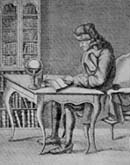

3 October 1753
[ Tallentyre's Commentary: The Comte d'Argental This letter was written when Voltaire was nearing Colmar, where he spent nearly a year in hard literary work before settling in Switzerland."Mme. de Montaigu," Lady Mary Wortley Montagu, the famous letter-writer, who introduced inoculation into England from the East in 1717.
"The late Queen." This was Queen Caroline of England, wife of George II.
"That Fontenelle would have outlived Mme. d'Aumont." Fontenelle--in Voltaire's own words "poet, philosopher, scholar"--the nephew of the great Corneille, was known as the author of the Plurality of Worlds and for his extraordinary length of days. " Fontenelle," said Voltaire, "was a Norman, he cheated even nature." He died in 1757, being a hundred years old.]
Near Colmar, October 3, 1753.My dear angel, if the Maréchale de Duras, who looks so very strong-minded, had done as did Mme. de Montaigu and the late Queen--if she had been courageous enough to give the smallpox to her children, you would not be mourning the Duchesse d'Aumont to-day. Thirty years ego I declared that a tenth part of the nation might thus be saved. A few people, grieved by the loss of valuable lives from smallpox in the flower of their youth, say, "Really, inoculation ought to be tried": and by the end of a fortnight they have forgotten alike those who have fallen victims to the scourge and those who yet will fall.
Last year, the Bishop of Worcester preached in London before the Houses of Parliament in favour of inoculation, and proved that it saved, in London alone, two thousand lives a year. That was a sermon which did much more good than the stuff our preachers talk....
I dare not ask you to give my respects and sympathy to the Duc d'Aumont. Who would have thought that Fontenelle would have outlived Mme. d'Aumont! But a hundred years and thirty are the same before Death's scythe. Our life is a point in space--a dream. My life's dream has been a perpetual nightmare: it would be very soothing if, at the end of it, I could see you: that would be a very pleasant light on which to open my eyes. . .